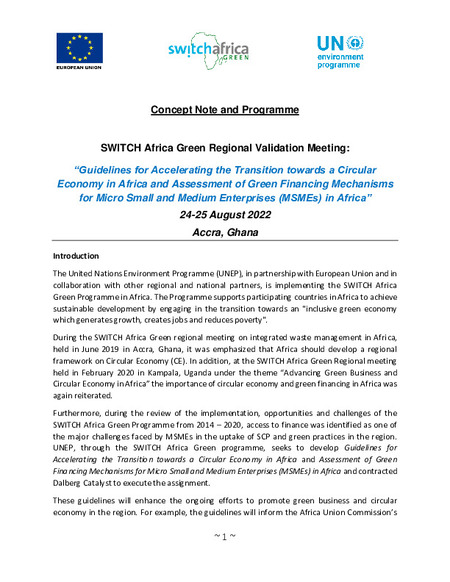Faecal Sludge Management in Africa: Socioeconomic Aspects and Human and Environmental Health Implications

Date
2020Author
United Nations Environment Programme
International Water Management Institute (IWMI)
Citation Tool
Bibliographic Managers
RT Generic T1 Faecal Sludge Management in Africa: Socioeconomic Aspects and Human and Environmental Health Implications A1 United Nations Environment Programme, International Water Management Institute (IWMI) YR 2020 LK https://wedocs.unep.org/20.500.11822/34350 PB AB TY - GEN T1 - Faecal Sludge Management in Africa: Socioeconomic Aspects and Human and Environmental Health Implications AU - United Nations Environment Programme, International Water Management Institute (IWMI) Y1 - 2020 UR - https://wedocs.unep.org/20.500.11822/34350 PB - AB - @misc{20.500.11822_34350 author = {United Nations Environment Programme, International Water Management Institute (IWMI)}, title = {Faecal Sludge Management in Africa: Socioeconomic Aspects and Human and Environmental Health Implications}, year = {2020}, abstract = {}, url = {https://wedocs.unep.org/20.500.11822/34350} } @misc{20.500.11822_34350 author = {United Nations Environment Programme, International Water Management Institute (IWMI)}, title = {Faecal Sludge Management in Africa: Socioeconomic Aspects and Human and Environmental Health Implications}, year = {2020}, abstract = {}, url = {https://wedocs.unep.org/20.500.11822/34350} } TY - GEN T1 - Faecal Sludge Management in Africa: Socioeconomic Aspects and Human and Environmental Health Implications AU - United Nations Environment ProgrammeUnited Nations Environment Programme, International Water Management Institute (IWMI) UR - https://wedocs.unep.org/20.500.11822/34350 PB - AB -View/Open
Item Statistics
Display item statisticsMetadata
Show full item recordDescription
This publication aims to explore how current trends in faecal sludge management are impacting human and environmental health in Africa (both sub-Saharan and Northern Africa). Faecal sludge comes from on-site sanitation technologies in the form of raw or partially digested slurry or semi-solid material. Its management involves storage, collection, transport, treatment and safe end use or disposal. Some factors that make it difficult to manage sustainably include population growth and urbanization, over-reliance on financial aid for the construction of treatment plants, low revenue generation from users of treatment facilities, poor operation and maintenance, and inefficient institutional arrangements for faecal sludge management.
Poor faecal sludge management poses major health, environmental and socioeconomic differential risks to men, women, boys and girls in Africa. Alongside poor sanitation, it contributes to the 115 deaths per hour from excreta-related diseases in Africa and huge economic losses. Some good practices along the sanitation value chain that have been reported in a few countries have the potential for replication in several other African countries. Overall, there is a need to invest in sanitation systems and mechanisms to improve faecal sludge management and direct investments to very poor households. In particular, bottlenecks in service delivery pathways require urgent attention.
Collections
Document Viewer
To read more, scroll down below.
Related items
Showing items related by title, author, creator and subject.
-
Concept Note and Programme - SWITCH Africa Green Regional Validation Meeting: “Guidelines for Accelerating the Transition towards a Circular Economy in Africa and Assessment of Green Financing Mechanisms for Micro Small and Medium Enterprises (MSMEs) in Africa”: 24-25 August 2022 Accra, Ghana
United Nations Environment Programme (2022-08)The overall objective of the regional validation meeting is to provide a platform for various stakeholders in the region to review and validate the two raft reports to ensure they capture the relevant inputs following the ... -
Bamako Convention on the Ban of the Import into Africa and the Control of Transboundary Movement and Management of Hazardous Wastes within Africa - Third Conference of the Parties “From Decisions to Action: Working for Africa with a Safe Chemicals and Waste Future”: Information Note
United Nations Environment Programme; Bamako Convention (2020)Information note on the COP3, held at Centre International Conférence de Kintélé in Brazzaville, Congo Republic. -
Conference of the Parties to the Bamako Convention on the Ban of the Import into Africa and the Control of Transboundary Movement and Management of Hazardous Wastes within Africa “The Bamako Convention: A platform for a Pollution Free Africa” - Report by the Secretariat on the Implementation of the Bamako Convention
United Nations Environment Programme; Bamako Convention (2018)During the negotiations process for the Basel convention the position of the African countries was in favor of a total ban of transboundary movements of hazardous waste, instead of the mechanism of controlling and monitoring ...




